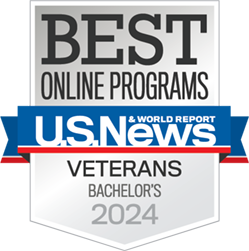
Managing Clinical Knowledge for Healthcare Improvement
We are no longer accepting applications to this program. Please refer to our other program offerings.
100% Online
24 Months*
The George Washington University’s (GW) online Bachelor of Science in Health Sciences (BSHS) in Clinical Operations and Healthcare Management is a degree-completion program that teaches you what it takes to manage clinical operations services and improve overall patient care and safety through cost-efficient clinical healthcare delivery system. This program explores managing clinical knowledge for healthcare improvement while providing learners with the credentials to meet the clinical medical practice requirements in one of the fastest-growing fields in the nation.
*The total number of credits and duration of the program depend on the number of transferred credits
*Indicates required field
- Read: Privacy Disclaimer Acknowledgment
-
By submitting your contact information, you are providing your express consent authorizing GW and GW's representatives to contact you by email, phone, or text (including the use of an automatic dialing system). Standard text messaging and/or data rates may apply.
If you do not provide your contact information (phone and email), we may not be able to provide you with the information you requested.
If you provided your contact information but no longer wish to receive phone calls, emails, or text (SMS) messages from GW, you will have the option to opt-out. Emails and Text messages will include details for unsubscribing/opting out. To opt out of receiving phone calls from GW, contact us via email at info@hsprograms.gwu.edu or text/ call: 202-792-2819.
By submitting your information via this form, you also confirm that you have read and understood the GW Statement of Privacy Practices.
Note that the consent requested above is not required for enrollment in GW's programs. If you do not consent to providing the information requested on this form, you may contact us via email at info@hsprograms.gwu.edu or text/ call: 202-792-2819.
Accreditation and Rankings
- GW is accredited by the Middle States Commission on Higher Education
- #62 Best National University*
- #13 Best Online Bachelor's Programs*
- #7 Best Online Programs for Veterans*
* The U.S. News & World Report – 2024 Rankings



Program Highlights
- 100% online, no campus visits required
- 20 total courses are required to complete your degree
- Graduate in about two years by transferring up to 60 credit hours from a regionally accredited institution
- Learn to optimize clinical operations services by seeing the big picture of health care delivery
Program Outcomes
When you graduate from this program, you will hold the skills and knowledge to:
- Apply knowledge of healthcare services’ topics, forces, and factors that influences the present and future direction of healthcare.
- Integrate the influences of individual behavior, the environment, communication, and health information technology to support excellence in the clinical operations healthcare management.
- Apply the core managerial knowledge, practice leadership and managerial, and quantitative skills of clinical operations healthcare management needed that will positively affect performance as a healthcare manager.
- Engage in critical and innovative thinking, reflection, and problem-solving through evidence-based practice in multiple healthcare settings to solve complex healthcare problems.
- Apply the theories and practices of clinical operations healthcare management in the practice setting.
- Explain structural determinants adversely impacting the health of socially disadvantaged groups from diverse perspectives.
Who Is the Ideal Student for This Program?
Clinical operations and healthcare managers are committed to finding value-based solutions to complex problems that help deliver high-quality care to the patients and populations they serve. These professionals are realistic in their budgets and demands, exhibit expert operations management skills, listen to and understand employees’ needs, and have the infectious energy to lead teams through changes big and small.
The BSHS in Clinical Operations and Healthcare Management program provides current students and graduates the opportunity to gain significant foundational learning knowledge needed to meet today’s clinical medical practice requirements. Upon completion, graduates will have the credentials to achieve certification and/or fellowship status for many clinical healthcare management professional associations such as ACHE, HFMA, HIMSS MGMA, ACMPE, NAHQ, Six Sigma, and Lean, Project Management, to name a few.
Below is a list of the health care professional associations that students and graduates can consider joining to advance their learning and professional potential:
- ACHE American College of Healthcare Executives (www.ache.org)
- HFMA The Healthcare Financial Management Association (www.HFMA.org)
- HIMSS Healthcare Information and Management Systems Society (www.himss.org)
- MGMA Medical Group Management Association (www.mgma.com)
- NAHQ National Association for Healthcare Quality (www.nahq.org)
- AAHAM The American Association of Healthcare Administrative Management (https://aaham.org)
- AHIMA American Health Information Management Association
- APHA American Public Health Association (www.apha.org)
- ANA American Nursing Association (www.nursingworld.org)
- AMA American Medical Association (www.ama.org)
Career Outlook
As the large baby-boom population ages and people remain active later in life, there will be increased demand for clinical healthcare services. Skilled healthcare operations managers are needed in a variety of clinical healthcare settings across the continuum of care and the continuum of the lifespan.
The U.S. Bureau of Labor Statistics projects 32% growth in employment of medical and health services managers from 2020 to 2030, with a median salary in 2020 of $104,280.1
According to Burning Glass, from May 2020 to May 2023, employers in high-paying metro areas were seeking clinical operations and healthcare managers with a bachelor’s degree:
- New York City, 12,319 job postings, $141,120 mean salary
- Boston, 5,719 job postings, $139,450 mean salary
- Washington D.C., 4,292 job postings, $140,770 mean salary
- Philadelphia, 5,134 job postings, $123,440 mean salary
- Baltimore, 2,505 job postings, $128,090 mean salary
Admission Requirements
To apply for the BSHS in Clinical Operations and Healthcare Management, you’ll need:
- Completed application
- 2.5 GPA or above on a 4.0 scale
- Prerequisite Coursework: Applicants must have completed a minimum of 45 credits of college-level coursework at a regionally accredited institution of higher education.
- Resume/CV
- Personal statement
- One letter of recommendation
If you have an associate degree from a participating D.C., Maryland or Virginia community college, you may be eligible for guaranteed admission to this program. Review the list of participating institutions or complete this form to speak with an Online Admissions Advisor for more details.
Tuition Details
The BSHS in Clinical Operations and Healthcare Management program at GW consists of 60 credit hours. Please find the cost per credit hour and total estimated program costs here.
Note: Tuition rates are subject to change and additional fees may vary by program.
Meet the Program Director

GW’s experienced faculty provide you with the rich, practical knowledge and support needed for you to succeed in the program and in your career.
Mountasser Kadrie, PhD, MHA, FACHE, FACMPE, FHIMSS
- Read Full Bio
-
Dr. Mountasser Kadrie has over 30 years of healthcare executive management experience gained from holding executive leadership appointments at world-renowned health systems and leading academic medical centers. Dr. Kadrie’s executive expertise has been focused on the development and implementation of strategies to maximize organizational performance and promote transformational change.
In addition to his extensive background in business and healthcare administration, Dr. Kadrie is a leader in the higher education industry, scholar, and subject matter expert. His professional and research interests are focused in the areas of U.S. and global healthcare health systems, health informatics, change management and leadership, strategy, operations management, high-reliability organizations, and higher education transformation.
Dr. Kadrie is a widely published author, and his research has appeared in many prestigious academic journals, and he presented at national and international meetings on topics related to his work in the healthcare and higher education fields.
Dr. Kadrie serves as a board member at prestigious healthcare and higher education institutions. He is a subject matter expert and has also consulted extensively with universities, national, and international healthcare organizations in the areas of strategy, program development, and change management.
Dr. Kadrie is a Fellow of the American College of Healthcare Executives (FACHE) and a Fellow of the American College of Medical Practice Executives (FACMPE). He is a Board Certified Examiner with the National Institute for Standards and Technology (NIST) – The Malcolm Baldrige National Quality Performance Program and is a Certified Professional in Health Information Management Systems (CPHIMS).
Source and Disclaimers:
- Bureau of Labor Statistics (2021 September 8). Medical and Health Services Managers. Occupational Outlook Handbook. Retrieved February 14, 2022, from https://www.bls.gov/ooh/management/medical-and-health-services-managers.htm.
Curriculum Details
We are no longer accepting applications to this program. Please refer to our other program offerings.
60 TOTAL CREDITS REQUIRED, 100% ONLINE
120 credits in required and elective courses; at least 60 of these credits must be taken at GW. Students may transfer in up to 60 college credit hours from another institution, which are applied towards the general education and advanced standing requirements. They then must earn at least 60 college credit hours at GW to meet the academic residency requirement, of which 48 credit hours are required courses for the major.
Students may be considered for review with a minimum of 24 transfer credits but will be required to complete any missing general education credit hours in addition to completion of the 60 programmatic hours. Transfer credit hours will be evaluated prior to admission
Core
- CML 3101 Management of Human Resources in Health Sciences Organizations (3)
-
Theory and application of management and leadership as they affect the management of human resources in health sciences organizations. Focus is on leadership, ethics, and organizational dynamics in a changing health care environment.
- CML 4144 Seminar in Health Science Leadership (3)
-
The goal of the course is to enable learners to propose and analyze multi-dimensional solutions that address complex issues encountered in the management and leadership of health sciences clinical enterprises.
- COHM 3142 Finance for Health Care Managers (3)
-
Introduction to key finance competencies necessary for clinical and healthcare operations; costs, expenditure, and reimbursement of services.
- COHM 4101 Marketing for Healthcare Leaders (3)
-
Skills needed by health care leadership to promote services and strategic change; theory and application of marketing principles for the purpose of project planning, organizational growth, and public relations.
- COHM 4110 Strategic Communication for Health Professionals (3)
-
Overview of health communication research, theory, and practice, examining the powerful communication influences on delivering care and health promotion.
- COHM 4145 Case Studies for Clinical Healthcare Management and Leadership (3)
-
Builds on prior coursework to apply clinical operations and health care management practices to a case studies format Students analyze and discuss real-life operational case studies from various health care organizations.
- COHM 4150 Practicum in Clinical Operations (3)
-
Supervised field work in clinical operations and health management, arranged in consultation with the program director. May be repeated for credit.
- HSCI 2050 Foundations of Health Equity (3)
-
The cross-cutting nature of the social determinants of health and clinical and biomedical implications in practice and research settings. This is the prerequisite course to begin the health equity micro-minor.
- HSCI 2105 Current Issues in Bioethics (3)
-
Basic issues, approaches, and requirements of ethically acceptable decision making with patients, including patient confidentiality, conflicts of interest, allocation of scarce resources, occupational risks in health care, and professional responsibility for overall quality of care.
- HSCI 2117 Introduction to Statistics for Health Science (3)
-
Foundational concepts in descriptive and inferential statistics, including probability, sampling distribution, estimation, correlation, t-Test, simple linear regression, and chi-square. Application of statistical concepts and methods within the health sciences.
- HSCI 2112W Writing in the Health Sciences (3)
-
Introduction to the health sciences literature Emphasis is on construction, evaluation and organization of written communication of health sciences information.
- HSCI 3109 Trends and Innovations in Healthcare (3)
-
New technologies, healthcare delivery models, and the phenomenon of sophisticated consumers. Assessment of the impact of science, technology, ethics, and government on the provision of healthcare.
- HSCI 3113 Health Policy and the Health Care System (3)
-
Incorporates economic theory and policy analysis methodology to analyze the impact of changes in the health care system on the practice of health sciences professionals and the quality and process of health care. Development of critical thinking skills through review of current medical literature.
- HSCI 3114 Management of Health Science Services (3)
-
Application of management and organizational principles to the delivery of services provided by health sciences disciplines Issues addressed include information systems, leadership, team building, fiscal management, human resources management, quality improvement, and management of conflict and change.
- HSCI 3118 Quality Improvement in Health Care (3)
-
Analysis of the structures in place to enhance the quality of health care delivery and political and economic influences that affect quality improvement programs. Assessment of specific interventions to enhance health care from the perspectives of providers and patients.
- HSCI 4103 Health Care Law and Regulation (3)
-
This is an upper division course intended to introduce students to the legal structures, rules, and mechanisms important to health care professionals, executives and organizations. Students analyze a range of legal standards related to medical malpractice and liability, fraud and abuse, and health care compliance. Since this is a health sciences course, trends in genetics, pharmacy law, and laboratory law will be discussed. In addition, students will become familiar with key legal terms, documents, and sources of law; the tools of communication and governance that shape health care arrangements and practices.
- HSCI 4106 Intro to Epidemiology for Health Sciences (3)
-
An introduction to epidemiological methods and their applications in the prevention and control of illness, community and clinical interventions, and health services.
- HSCI 4112W Research and Writing in Health Sciences (3)
-
Includes a significant engagement in writing as a form of critical inquiry and scholarly expression to satisfy the WID requirement.
- INFR 4101 Introduction to Medical Informatics (3)
-
Medical informatics applications and innovations in health care and the health care system; implications for health care delivery and patient outcomes, including electronic medical records, health system databases, and medical data analysis.
- RAFF 3101 Introduction to Regulatory Affairs (3)
-
Introduction to the field of regulatory affairs to regulations, strategies, and laws that apply to safe and effective product development.
Key Dates
We are no longer accepting applications to this program. Please refer to our other program offerings.
|
Fall 2024 |
Spring 2025 |
|
| Application Deadline |
July 20, 2024 (Closed) |
December 1, 2024 (Closed) |
Admissions Requirements
To apply for the BSHS in Clinical Operations and Healthcare Management program (100% online), you’ll need:
| Completed Application |
| 2.5 GPA or above on a 4.0 scale |
| Resume/CV |
| Prerequisite Coursework: Applicants must have completed a minimum of 45 credits of college-level coursework at a regionally accredited institution of higher education with a minimum cumulative and science GPA of 2.5. Prerequisite courses that must be completed prior to admission include the General Education courses (and credits) listed below: 6 credits in English composition 3 credits in college mathematics (college algebra, statistics, or above) 4 credits in natural or physical science with a lab 6 credits in social sciences 3 credits in humanities |
| Personal statement: Please include a 250–500 word essay describing your reasons for undertaking study at the George Washington University (GW) and your academic objectives, career goals, and related qualifications, including collegiate, professional, and community activities relevant to your program of interest. Include any substantial accomplishments not already mentioned on the application form. |
|
One letter of recommendation Letter of recommendation should be from:
Recommender will submit a letter via the application portal on letterhead and has a signature and credentials/contact information. |
| Application fee: A non-refundable application fee of $80 is required. The application fee is waived for active-duty U.S. military, current GW students, degree-holding GW alumni, current McNair Program Scholars, and graduates of minority-serving institutions (MSI). |
| Official transcripts from every college and university attended. All non-U.S. transcripts (including those in English) must be evaluated by an accredited foreign credential agency. Please find the list of member organizations here: https://www.naces.org/members. |
International Students
International students should check with individual programs regarding eligibility for visa sponsorship. Generally, online and hybrid programs are not eligible for student visa sponsorship from GW. This would include transfer students from any other institution with an existing visa.
Official transcripts from institutions outside the U.S. must be accompanied by an official transcript evaluation from an accredited independent evaluating agency. Please be sure you request a detailed evaluation that includes all course titles, credit hours, grades, U.S. degree equivalency, grade-point averages (GPA), and date of degree conferral. For a list of acceptable foreign credential evaluation services, please visit NACES.
Applicants who are not U.S. citizens are also required to submit official test scores for the Test of English as a Foreign Language (TOEFL) or Pearson’s Test of English (PTE) Academics or the academic International English Language Test System (IELTS). To be considered for admission, there are required scores that you will need to meet. Score requirements may differ by school and program so check the admissions requirements for your program.
Supporting Documents and Official Transcript
Documents and Official Transcripts not submitted online should be mailed to:
Mail: George Washington University
ATTN: Transcript Processing Center
1415 W 22nd St.
Suite 220
Oak Brook, IL 60523
Alternatively, official electronic transcripts can be sent to: transcripts@hsprograms.gwu.edu